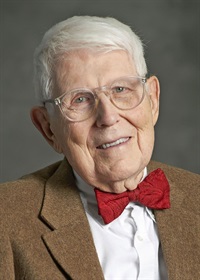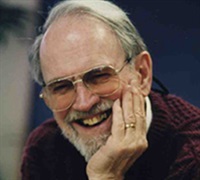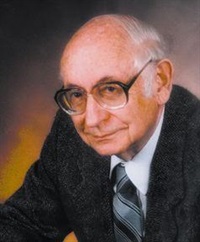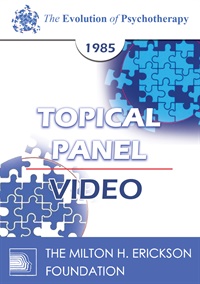EP85 Panel 04 - Psychotherapy Research - Aaron T. Beck, MD; James F.T. Bugental, PhD; Ernest L. Rossi, PhD; Joseph Wolpe, MD
- Average Rating:
- Not yet rated
- Topic Areas:
- Topical Panels | Psychotherapy | Research
- Categories:
- Evolution of Psychotherapy | Evolution of Psychotherapy 1985
- Faculty:
- Aaron Beck, MD | James Bugental, PhD | Ernest Rossi, PhD | Joseph Wolpe, M.D.
- Course Levels:
- Master Degree or Higher in Health-Related Field
- Duration:
- 1:02:15
- Format:
- Audio and Video
- Original Program Date:
- Dec 11, 1985
- License:
- Never Expires.
Description
Description:
Educational Objectives:
- To compare and contrast clinical and philsophical perspectives of experts.
*Sessions may be edited for content and to preserve confidentiality*
Credits
Faculty

Aaron Beck, MD Related Seminars and Products
Dr. Aaron T. Beck, M.D. is University Professor of Psychiatry (Emeritus) in the Department of Psychiatry, Perelman School of Medicine at the University of Pennsylvania and director of the Aaron T. Beck Psychopathology Research Center. Based on his research on the psychological processes involved in depression and other disorders, he developed and tested Cognitive Therapy (also known as Cognitive Behavior Therapy), the most widely used form of psychotherapy in the world. He has personally trained large numbers of professionals in this specialized approach and helped to form centers for Cognitive Therapy throughout the world, devoted to both research and serving countless numbers of patients. Starting in 2007, he has directed the Beck Initiative partnership in collaboration with Arthur Evans, former Commissioner of Mental Health of Philadelphia, serving the Medicaid patients in the city. He and his group have been training providers, offering services to the most disadvantaged individuals in the city and state: severely mentally ill individuals confined to hospitals and jails, and also the homeless.
For several decades, Beck conducted research on the psychological and social factors involved in schizophrenia and developed a humanistic approach involved in activating the individual’s latent goals, motivations, and capacities, and has helped to restore large numbers to meaningful lives. His innovative approach in Philadelphia and Pennsylvania has now been extended to other states such as Georgia, Massachusetts, New Jersey, and Utah. In collaboration with the National Association of State Commissioners of Mental Health, he and his Center have started to disseminate his approach throughout the country. In addition, he and his team are working with Gary Gottlieb, Chief Executive Officer of Partners in Health to adapt cognitive therapy to the needs of individuals in 27 developing countries.
Beck has described his work extensively in 637 publications, including 24 books. He has been named by Medscape as one of the 50 Most Influential Physicians in History: 20th on the list and 1st among the living. He has received the 2006 Albert Lasker Award for Clinical Medical Research, which “transformed the understanding and treatment” of mentally ill individuals, the 2006 National Academy of Medicine: Lienhard Award for the advancement of health services, the 2013 Kennedy Community Health Award, and the National Alliance on Mental Illness Lifetime Achievement Award (June, 2017).

James Bugental, PhD Related Seminars and Products
James Bugental, PhD, was one of the predominant theorists and advocates of the Existential-Humanistic Therapy movement. He received his Ph.D. from Ohio State University in 1948, was named a Fellow of the American Psychological Association in 1955, and was the first recipient of the APA's Division of Humanistic Psychology's Rollo May Award. James devoted himself to teaching and writing; he was also an Emeritus Professor, Saybrook Institute, and an Emeritus Clinical Lecturer (formerly Associate Clinical Professor), Department of Psychiatry, Stanford University Medical School. In 1987, he was the recipient of the first annual Rollo May Award of the Mentor Society "for contributions to the literary pursuit," and in 1986, he received a certificate "in recognition of the distinguished contribution to the discipline of Clinical Psychology" from the Division of Clinical Psychology, American Psychological Association. He was a past president of the Association for Humanisitic Psychology and served on the editorial boards of eight professional journals. Bugental has written 150 articles, reviews, comments, and chapters in books edited by others.

Ernest Rossi, PhD Related Seminars and Products
Ernest L. Rossi, PhD, is an internationally renowned therapist, teacher and pioneer in the psychobiology of mind-body healing. The author of more than 24 professional books, Dr. Rossi worked with Milton Erickson for eight years and co-authored three classic volumes on therapeutic hypnosis with him. Rossi has also edited four volumes of Erickson's Collected Papers and four volumes of Erickson's Seminars, Workshops and Lectures. He has been conducting research in the psychosocial genomics of ultradian rhythms and their relation to mind-body healing and psychotherapy for over three decades.

Joseph Wolpe, M.D. Related Seminars and Products
Joseph Wolpe, MD, was a South African psychiatrist, one of the most influential figures in Behavior Therapy. Wolpe grew up in South Africa, attending Parktown Boys' High School. Joseph received his M.D. in 1948 from the University of Whitatersrand in Johannesburg, South Africa. He was Emeritus Professor fo Psychiatry and Former Director of Behavior Therapy Unity at Temple University Medical School. He was Professor of Psychiatry at the Medical College of Pennsylvania. One of the leading practitioners of behavior therapy, he has authored three books and co-edited two, and has more than 200 professional publications. He cofounded the Journal of Behavior Therapy and Experimental Psychiatry. He is receipient of the Distinguished Scientific Award for the Applications of Psychology from the American Psychological Association.


